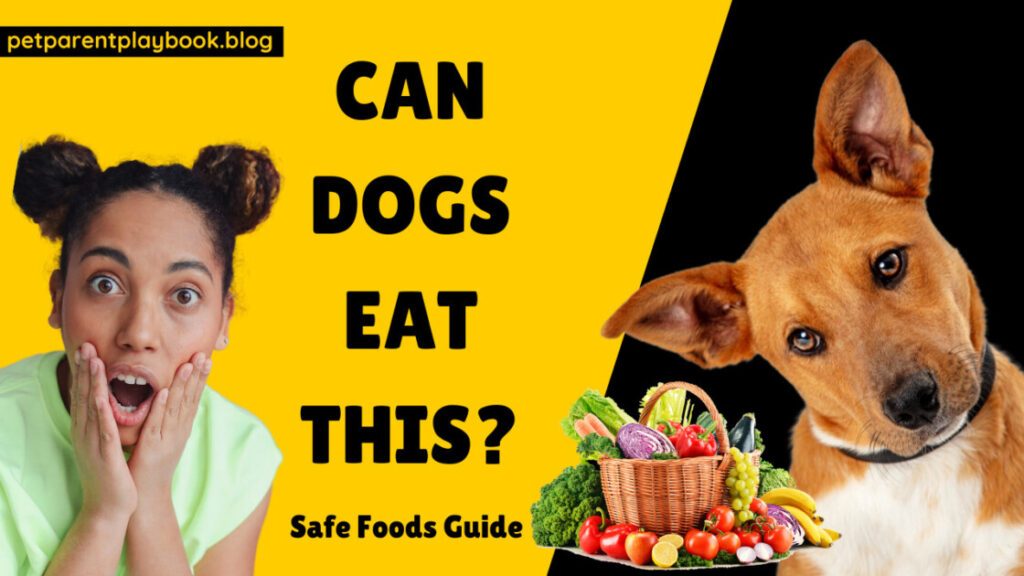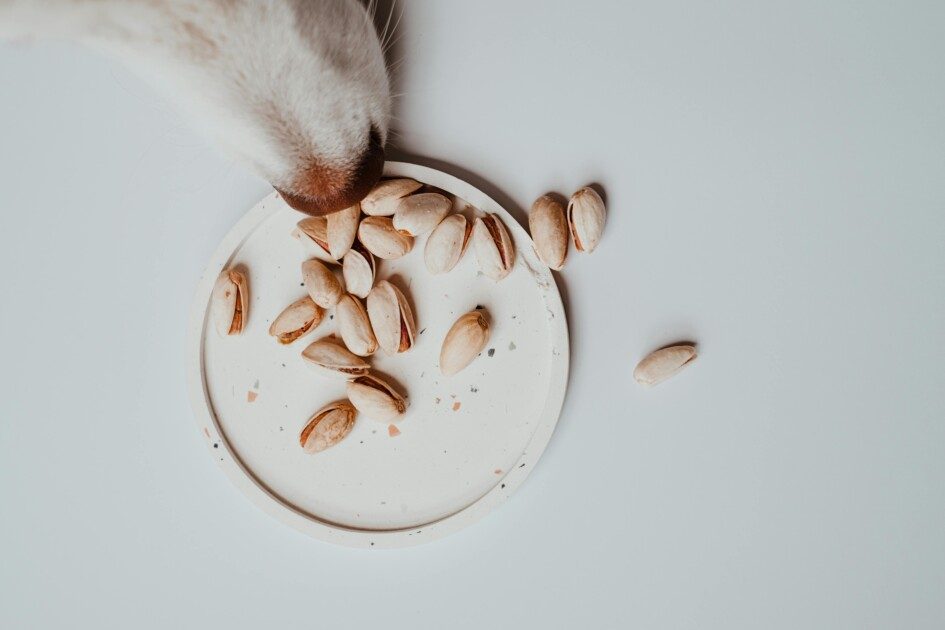Ever found yourself sharing a picnic with your furry best friend? Those pleading eyes can make it hard to resist slipping them a bite of your yummy treats. But can dogs eat everything humans can? Let’s explore the delicious world of dog-friendly snacks and answer the question: “Can my dog enjoy this too?”

Fruits & Veggies: Nature’s Candy for Canine Companions (with a Few Exceptions)
The good news is that many fruits and veggies are safe and even beneficial for dogs! Here’s a breakdown of some popular picnic picks:
- Banana: Yes! In moderation, bananas are a great source of potassium and fiber for your pup. Just be sure to remove the peel, which can cause digestive issues.
- Apple: Another winner! Sliced apples provide vitamins and fiber, but skip the core and seeds, which can pose a choking hazard.
- Watermelon: Absolutely! This refreshing treat is mostly water, making it perfect for hot days. Just remove the seeds, which can cause digestive upset.
- Tomatoes: Proceed with caution. Ripe tomatoes are generally safe in small amounts, but the green parts of the plant can be toxic. It’s best to avoid them altogether.
- Pineapple: Yes, in moderation! This tropical treat is full of vitamins, but too much can cause stomach upset. Stick to a few small chunks.
- Orange: Not the best choice. Citrus fruits can irritate your dog’s stomach.
- Strawberries: A delicious and healthy option! Strawberries are packed with antioxidants and fiber. Just wash them thoroughly before offering them to your pup.
- Avocado: A big no-no! Avocados contain persin, a toxin that can be harmful to dogs.
- Blueberries: These antioxidant powerhouses are safe for dogs in moderation.
- Mango: Yes, but with caution. Mango flesh is okay, but the pit and skin can cause digestive problems.
- Cucumber: Cool and refreshing! Sliced cucumbers are a healthy and hydrating snack for your dog.
- Shrimp: This can be enjoyed occasionally, but be mindful of shells and any seasonings, which can upset their stomach. Cooked, peeled shrimp are best.
Remember: Always introduce new foods slowly and monitor your dog for any allergic reactions or digestive upset.
Beyond the Basket: Other Human Foods to Avoid Sharing
While some human foods are dog-safe, others are strictly off-limits. Here are some to keep away from your furry friend:

- Grapes and Raisins: Highly toxic to dogs and can cause kidney failure.
- Chocolate: Contains theobromine, which is poisonous to dogs.
- Onions and Garlic: Can damage red blood cells in dogs.
- Macadamia Nuts: Can cause tremors, vomiting, and weakness in dogs.
- Corn on the Cob: The cob can cause choking and intestinal blockages.
- Cooked Bones: Can splinter and cause internal injuries.
- Salty Snacks: Too much salt can dehydrate your dog and lead to other health problems.
The Bottom Line: Listen to Your Pup & Consult Your Vet
When it comes to sharing your food, it’s always best to prioritize your dog’s health. Here are some final tips:

- Know your dog: Some dogs have sensitive stomachs and may not tolerate certain foods.
- Start small: Introduce new foods gradually to avoid digestive upset.
- Consult your vet: If you’re unsure about a particular food, ask your veterinarian for advice.
By following these guidelines, you can ensure your dog enjoys safe and delicious snacks while sharing happy moments with their favorite human (that’s you!). Remember, a happy pup is a healthy pup, and sometimes, all it takes is a small, dog-friendly treat to brighten their day!
Conclusion
As a pet lover, it’s important to know which human foods are safe for our furry friends. While many fruits and vegetables can be healthy treats for dogs, others can be harmful. Always introduce new foods slowly and in moderation, and consult with your veterinarian if you have any concerns.
Sharing healthy snacks with our dogs can be a wonderful way to bond and provide them with essential nutrients. By being informed and cautious, we can ensure our pets enjoy a happy and healthy life.
Call to Action
If you found this guide helpful, be sure to share it with other pet lovers! For more tips and information on pet care, follow Pet Parent Playbook on Instagram.
Can Dogs Eat Fruits and Vegetables? – FAQs
Can Dogs Eat Bananas?
Yes, dogs can eat bananas! Bananas are a great source of vitamins and potassium. They are low in calories and make a sweet, healthy treat. Just be sure to feed them in moderation to avoid digestive issues.
Can Dogs Eat Apples?
Yes, dogs can eat apples. Apples are rich in vitamins A and C and provide a good source of fiber. Make sure to remove the seeds and core before feeding them to your dog, as the seeds contain cyanide, which is toxic.
Can Dogs Eat Watermelon?
Yes, dogs can eat watermelon. Watermelon is hydrating and packed with vitamins. Be sure to remove the seeds and rind before giving it to your dog, as they can cause gastrointestinal issues.
Can Dogs Eat Tomatoes?
It depends. Ripe tomatoes are generally safe for dogs in small amounts. However, green tomatoes and the tomato plant contain solanine, which is toxic to dogs. Stick to small pieces of ripe tomato and avoid the plant itself.
Can Dogs Eat Pineapple?
Yes, dogs can eat pineapple. Pineapple is full of vitamins and minerals. It also contains bromelain, which helps in digestion. Remove the spiky skin and core before feeding the pineapple to your dog.
Can Dogs Eat Oranges?
Yes, dogs can eat oranges in moderation. Oranges are a good source of vitamin C. However, some dogs might not like the taste or may experience digestive issues, so introduce oranges slowly and in small amounts.
Can Dogs Eat Strawberries?
Yes, dogs can eat strawberries. Strawberries are rich in vitamins, fiber, and antioxidants. They can even help whiten your dog’s teeth! Just make sure to wash them thoroughly and cut them into small pieces.
Can Dogs Eat Avocado?
No, dogs should not eat avocado. Avocados contain persin, which is toxic to dogs. While the flesh is less toxic than the pit, skin, and leaves, it’s best to avoid giving avocado to your dog altogether.
Can Dogs Eat Blueberries?
Yes, dogs can eat blueberries. Blueberries are packed with antioxidants and vitamins. They make a healthy, low-calorie treat for your dog. Just give them in moderation to avoid any digestive upset.
Can Dogs Eat Mango?
Yes, dogs can eat mango. Mangoes are rich in vitamins A, B6, C, and E. Remove the skin and pit before feeding mango to your dog, as the pit contains cyanide and the skin can be hard to digest.
Can Dogs Eat Cucumber?
Yes, dogs can eat cucumber. Cucumbers are low in calories and make a great crunchy snack. They are also hydrating and can help keep your dog cool on a hot day.
Can Dogs Eat Shrimp?
Yes, dogs can eat shrimp in moderation. Shrimp are low in fat and calories but high in protein. Make sure the shrimp are cooked and the shells, tails, and veins are removed before feeding them to your dog.
Can Dogs Eat Cheese?
Yes, dogs can eat cheese in small amounts. Cheese is a good source of protein and calcium. However, some dogs are lactose intolerant, so introduce cheese slowly and watch for any signs of digestive upset.
Can Dogs Eat Broccoli?
Yes, dogs can eat broccoli in moderation. Broccoli is rich in vitamins and fiber. However, it contains isothiocyanates, which can cause gastric irritation in some dogs. Serve it in small amounts, either raw or cooked.
Can Dogs Eat Corn?
Yes, dogs can eat corn. Corn is a common ingredient in many dog foods. It is a good source of protein, carbohydrates, and essential fatty acids. However, do not feed your dog corn on the cob, as it can cause choking and intestinal blockages.
Can Dogs Eat Grapes?
No, dogs should not eat grapes or raisins. Grapes and raisins are highly toxic to dogs and can cause kidney failure. Even small amounts can be dangerous, so it’s best to keep them away from your dog entirely.
Can Dogs Eat Popcorn?
Yes, dogs can eat plain, air-popped popcorn in moderation. Popcorn is a low-calorie treat. Avoid giving your dog popcorn with butter, salt, or other toppings, as they can cause health issues.
Can Dogs Eat Peaches?
Yes, dogs can eat peaches in small amounts. Peaches are rich in vitamins A and C. Be sure to remove the pit, as it contains cyanide and can cause choking or intestinal blockages.
Can Dogs Eat Cantaloupe?
Yes, dogs can eat cantaloupe. Cantaloupe is hydrating and packed with vitamins. Remove the seeds and rind them before feeding them to your dog, as they can cause digestive issues.
Can Dogs Eat Cherries?
No, dogs should not eat cherries. Cherries contain cyanide, which is toxic to dogs. The pits, stems, and leaves are particularly dangerous. It’s best to avoid giving cherries to your dog altogether.